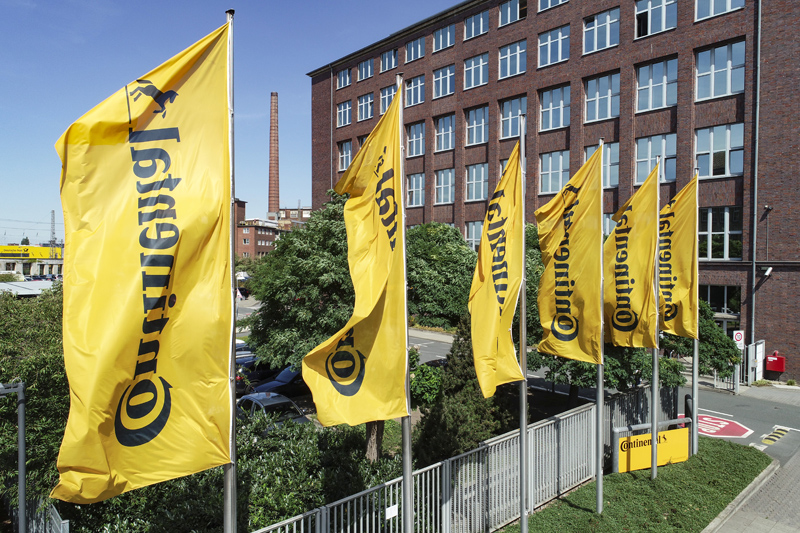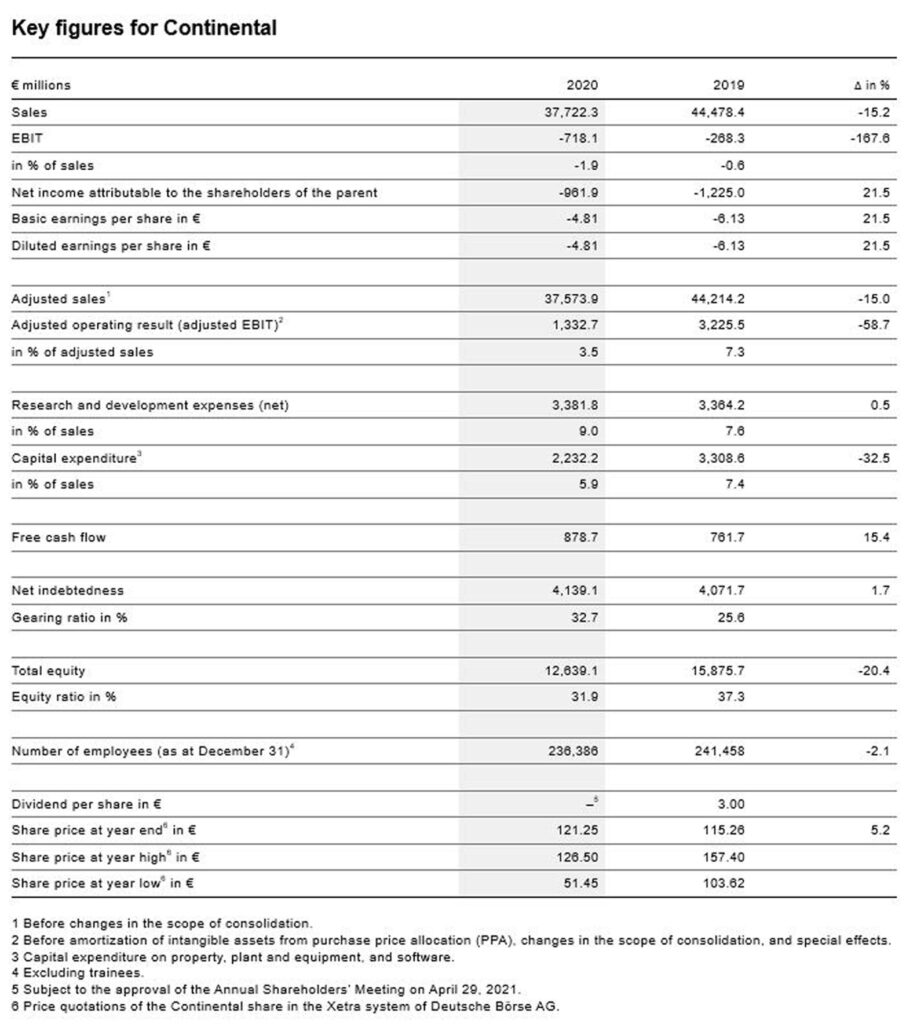Amid a historically weak market environment, Continental demonstrated operational and financial resilience in fiscal 2020 and achieved its adjusted annual targets. According to preliminary figures, the DAX company’s sales in the past fiscal year totaled €37.7 billion (2019: €44.5 billion). Organic sales growth declined by 12.7 per cent, while the production of passenger cars and light commercial vehicles decreased by 16 per cent compared to the previous year. In this extremely challenging market environment, the company achieved an adjusted EBIT margin of 3.5 per cent (2019: 7.3 per cent). That corresponds to an adjusted operating result of €1.3 billion (2019: €3.2 billion). The company mitigated the economic impact of the coronavirus pandemic by being extremely disciplined with its expenses and capital expenditure. As a result, Continental achieved free cash flow before acquisitions and carve-out effects of €1.1 billion (2019: €1.3 billion).

CEO Nikolai Setzer commented on the results at Continental’s annual press conference in Hanover on Tuesday: “In operational terms, we performed well in 2020 given the circumstances, achieving solid, positive free cash flow in particular. The bottom line is, however, that we suffered extensive setbacks with regard to both sales and earnings. We nevertheless finished the past year stronger overall than we had feared in the spring.”
In the past fiscal year, Continental posted an operating result of -€718 million and net income totaling -€962 million. The primary reasons for this included not only the lower sales trend, but also the non-cash impairments of goodwill that the company had already reported in October 2020 and recognized in the third quarter in the amount of €649 million (December 31, 2020: €655 million) as a result of revised market assumptions. In addition, the company incurred expenses and impairments on property, plant and equipment totaling €998 million in 2020, which were largely due to the structural program. Based upon this and in line with the company’s dividend policy (distribution of between 15 and 30 per cent of net income), the Executive Board has decided to propose a suspension of the dividend for fiscal 2020 to the Annual Shareholders’ Meeting, as has already been announced.
Navigating safely through the crisis
In view of the multitude of challenges and the resulting restrictions for employees worldwide, Setzer expressed his great appreciation for their overall accomplishments: “2020 was an enormously strenuous year for all of us. The coronavirus pandemic, the transformation of the automotive industry and the continuation of our structural program have demanded a great deal from us. The Continental team acted quickly and decisively, taking a creative approach to mastering unusual challenges and reducing our costs with a high level of discipline. For that, I am especially grateful to all employees worldwide.”
Continental enhanced its comprehensive protection concept for its employees right at the outset of the coronavirus crisis in 2020 in order to ensure a safe working environment during the pandemic. Employees in all countries have shared their ideas via internal digital platforms and undertaken projects that will help people throughout the world. In this way, they effectively provided assistance in numerous respects. For example, employees at several locations around the world promptly produced protective equipment for themselves and their colleagues.

Savings targets exceeded
Continental decreased its fixed cash costs in 2020 by more than €860 million (8 per cent) year-on-year. It thus reached its target and reduced its fixed cash costs by more than 5 per cent compared with the previous year. In addition, the company scaled back its capital expenditure on property, plant and equipment, and software by more than 32 per cent year-on-year to €2.2 billion (2019: €3.3 billion).
All business areas contributed to this decrease. The capital expenditure ratio thus declined to 5.9 per cent, after 7.4 per cent in the same period of the previous year.
In contrast, in 2020 Continental maintained its research and development expenses (net) at €3.4 billion, the same level as in the previous year. As a result of the strong decrease in sales, the ratio rose to 9.0 per cent, after 7.6 per cent in the same period of the previous year.
Solid, crisis-proof financial position
Continental’s financing needs as of the end of 2020 were covered by an extremely comfortable liquidity cushion totaling €10.7 billion (2019: €8.0 billion), comprising €2.9 billion (2019: €3.3 billion) in cash and cash equivalents and €7.8 billion (2019: €4.7 billion) in committed, unutilized credit lines.
Net indebtedness rose only slightly by €67 million to €4.1 billion compared to the end of 2019. The decrease in the corporation’s total equity caused the gearing ratio to increase year-on-year to 32.7 per cent (2019: 25.6 per cent).
Market outlook and forecast for 2021
“The fourth quarter has shown that we have passed the low point. The economic environment is gaining momentum,” explained Continental CFO Wolfgang Schäfer. He added: “The start of the current fiscal year has been subdued so far due to the shortage of semiconductors. The effects of the ongoing coronavirus pandemic remain a source of uncertainty too. All in all, 2021 will therefore remain challenging. We nevertheless anticipate that the market will recover significantly compared to 2020.” The company therefore expects a substantial increase in the production of passenger cars and light commercial vehicles in 2021 by an estimated 9 to 12 per cent compared to the previous year. At the same time, Schäfer pointed out that the company does not expect the record level of global automobile production from 2017 to be reached again before 2025.
On the basis of assumptions about trends in its markets and industries, Continental anticipates consolidated sales for 2021 of around €40.5 billion to €42.5 billion and an adjusted EBIT margin of around 5 to 6 per cent. Sales in the new Automotive Technologies group sector together with the former Powertrain division are expected to amount to around €24 billion to €25 billion, with an adjusted EBIT margin of around 1 to 2 per cent. Sales in the Rubber Technologies group sector are forecast to total about €16.5 billion to €17.5 billion, with an adjusted EBIT margin of around 11.5 to 12.5 per cent.

Realigned strategy
Continental held its Capital Market Days at the end of 2020. At this event, the company unveiled the three cornerstones of its realigned strategy: strengthen operating performance, differentiate its portfolio, and turn the change to connected and sustainable mobility into an opportunity.
Continental’s strategy aims for ambitious yet realistic medium-term goals. “As global vehicle production increases, our sales will grow again too. We are targeting organic growth at the group level of around 5 to 8 per cent per year on average over the medium term. Our goal for the adjusted EBIT margin is between about 8 and 11 per cent, and for the return on capital employed at around 15 to 20 per cent,” explained Setzer. “Continental sets itself apart from the others in the mobility market. We have a success-driven global team, a pioneering technology portfolio and extensive software expertise. These strengths will make us one of the winners of the transformation underway in the mobility industry.”
Higher investments in assisted and automated driving
In keeping with its newly aligned strategy, Continental will in the future be relying more heavily on its growth fields and future technologies, striving to achieve above-average profitable growth here. At the same time, Continental will secure value contributions in those product areas that have already established leading positions in a saturated market environment.
“So this clearly maps out the path to our success, and we will pursue it with resolve. One example in this regard is our future business with advanced driver assistance systems and systems for automated driving. Here, we are pooling all the necessary resources and intensifying our efforts substantially. This year alone, we are planning to spend about an additional €200 million to €250 million more,” Setzer said, explaining the company’s ambitious goals for this growth field: “We already have a strong position in this area. We are expanding this position extensively while accelerating the pace with which we are positioning ourselves as a top player in the autonomous mobility market. We are going to fully exploit the additional, attractive opportunities that arise for us from the high market dynamics in this area, turning them into profitable growth. At the same time, we are opening ourselves up further to cooperation with technology partners and startup companies. After all, our goal is and will continue to be global technology leadership when it comes to assisted and automated driving.”
Continental is one of the pioneers in the field of assisted, automated driving. As early as 1999, the technology company was involved in the development of world’s first adaptive cruise control system (Mercedes S-Class) and supplied the system’s long-range radar. Since that time, the market for assisted driving functions has evolved rapidly. Just in the years 2018 to 2020 alone, Continental received orders in this area totaling more than €9 billion from car manufacturers worldwide.
The mobility supplier intends to increase this amount substantially, as the potential scope of supply will go up in value many times over in the coming years as the degree of automation grows.
Carbon neutrality
Automated driving fosters anticipatory and safe driving, and thus sustainable mobility. This fits in well with the ambitious goals that the company set itself early in December 2020 with its sustainability roadmap, paving the way for a new global industry standard. Part of the roadmap relates to emission-free vehicles: from 2022, Continental will have achieved carbon neutrality in its global business for emission-free cars, buses, trains and other vehicles.
Continental’s program focuses the company on the best benefit for the climate and on a clear paradigm shift at the right point in time. The company has therefore adopted a strategy that will have an impact over both the short and long term. Continental is working intensively on further reducing its own CO2 footprint – for example by introducing green electricity in all plants worldwide in 2020. Continental’s entire procurement of electricity thus became CO2 neutral all at the same time. It reduces CO2 emissions within the plant premises by some 70 per cent, or more than 2 million tons of CO2 per year. By 2040, all of its production processes are to be made carbon neutral. By 2050 at the latest, Continental aims to be 100 per cent carbon neutral across its entire business, from one end of the value chain to the other.
Innovative strength
In 2020, Continental enhanced its technological expertise and brought safe, networked and sustainable mobility to the streets in millions of vehicles. The mobility supplier launched more than 800 production series worldwide in a pandemic-safe manner and delivered more than 1.4 billion components and systems in the Automotive Technologies group sector alone. Its ongoing high expenditure for research and development further bolstered its technological position.
By connecting tires with sensor systems, telemetric data, algorithms and the cloud, Continental is paving the way for the future of tire monitoring. The car-sharing provider SHARE NOW is already benefiting from tread depth predictions with millimeter accuracy in real time. In the future, preventative tire maintenance will be made possible by smart, digital tire solutions. The potential is huge. In total, Continental sold almost 130 million car and truck tires worldwide in 2020.
ContiTech’s service business is also being expanded and digitalized. For instance, the services it offers relating to conveyor belt systems were successfully expanded to include a drone-based inspection service that uses algorithms based on artificial intelligence (AI).
The heart of the company’s accelerated development in the automotive business is the new Continental supercomputer. With the fastest computer in the automotive industry, the training of AI in advanced driver assistance systems is accelerated to a significant degree. The first radar-based turn assist system for retrofitting trucks has also been introduced on the market. The mobility supplier launched the first production ramp-ups for high-performance computers and increased its order volume to over €4 billion. The success story of software at Continental therefore continues unabated.
Continental will continue its road tests for automated and autonomous driving in complex environments in fiscal 2021. It will also realize technological advances and numerous new production start-ups in multiple areas, including brake systems, networking in 5G and ultra-wideband (UWB), material development and human-machine interaction. These improvements will increase the comfort, convenience, safety and efficiency for vehicles with all types of drive systems.
Transformation 2019-2029 structural program
With the structural program it initiated in September 2019, Continental is ensuring its future viability and competitiveness by adapting its cost structure to global market conditions.
“The implementation of our global structural program is making good progress. We are working together with our social partners at the respective locations in a solution-oriented manner to create sustainable prospects for the employees affected by the program, while at the same time ensuring the future viability of our company. This process is sometimes painful, but global competition is becoming increasingly fierce. Therefore, we will only be able to secure our future success and thus jobs if we undertake the appropriate adjustments,” said Setzer.
150 years in the heartbeat of mobility
Continental will celebrate its 150th anniversary in 2021. In a variety of events, interactive journeys through time, and publications throughout the year, it will present the milestones that have marked its dynamic development over the last 15 decades. “Our heart beats for the freedom that mobility provides. Since it was founded, our organization has supported people in this regard. It has celebrated many highs and overcome many lows. We are now experiencing a profound turning point in our industry that we will use to springboard our start into a new industrial era. Now comes the next crucial step as we transform ourselves into a global technology company for connected solutions, with a focus on mobility. To do this, we are not just exploiting our traditional strengths; we are also considerably expanding in particular the areas of digitalization, software and sensor technology,” explained Setzer.